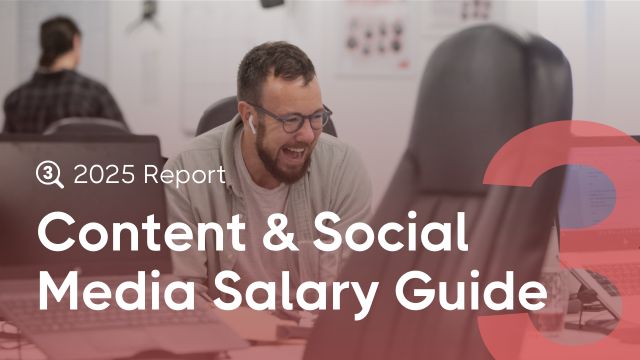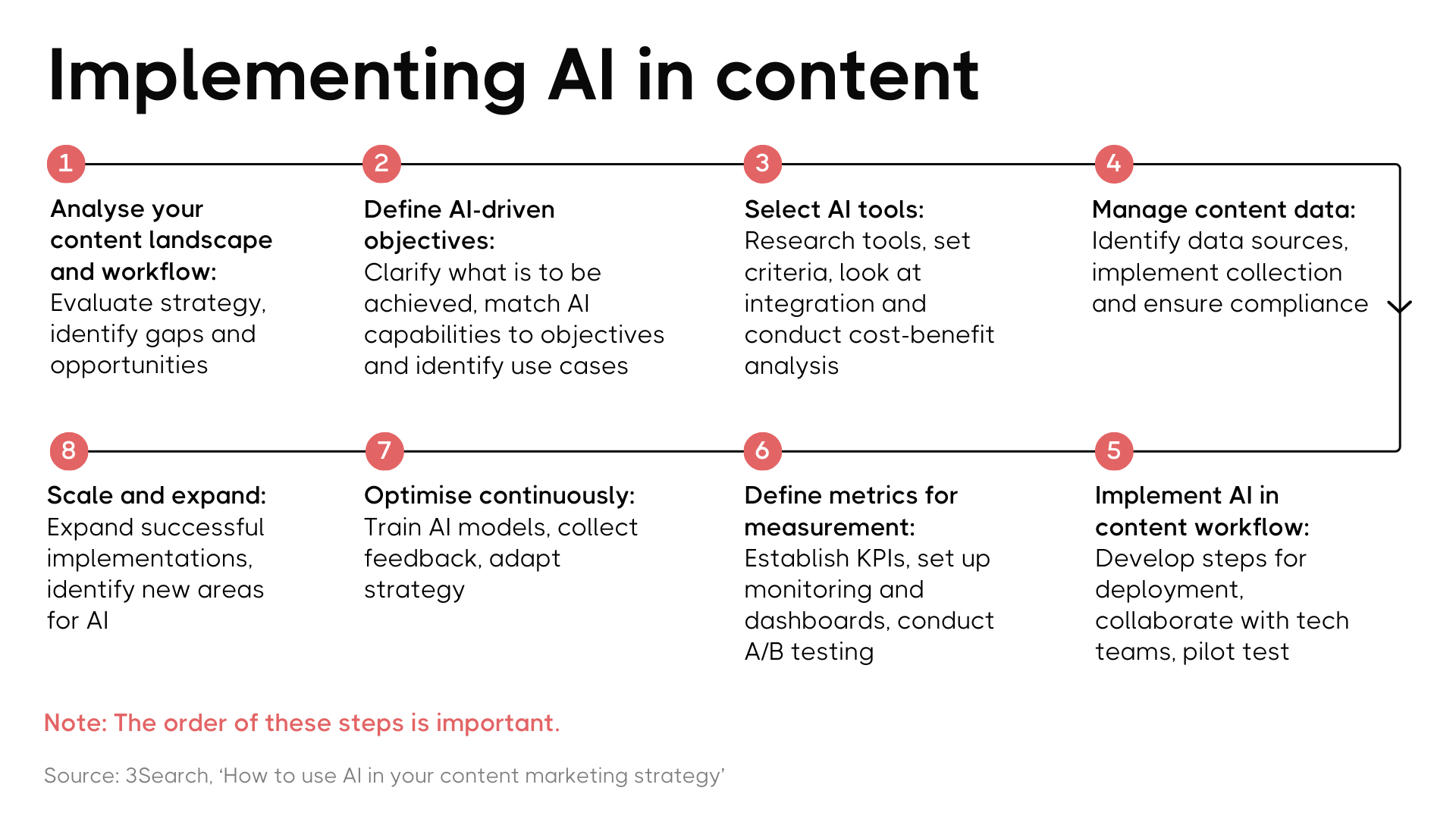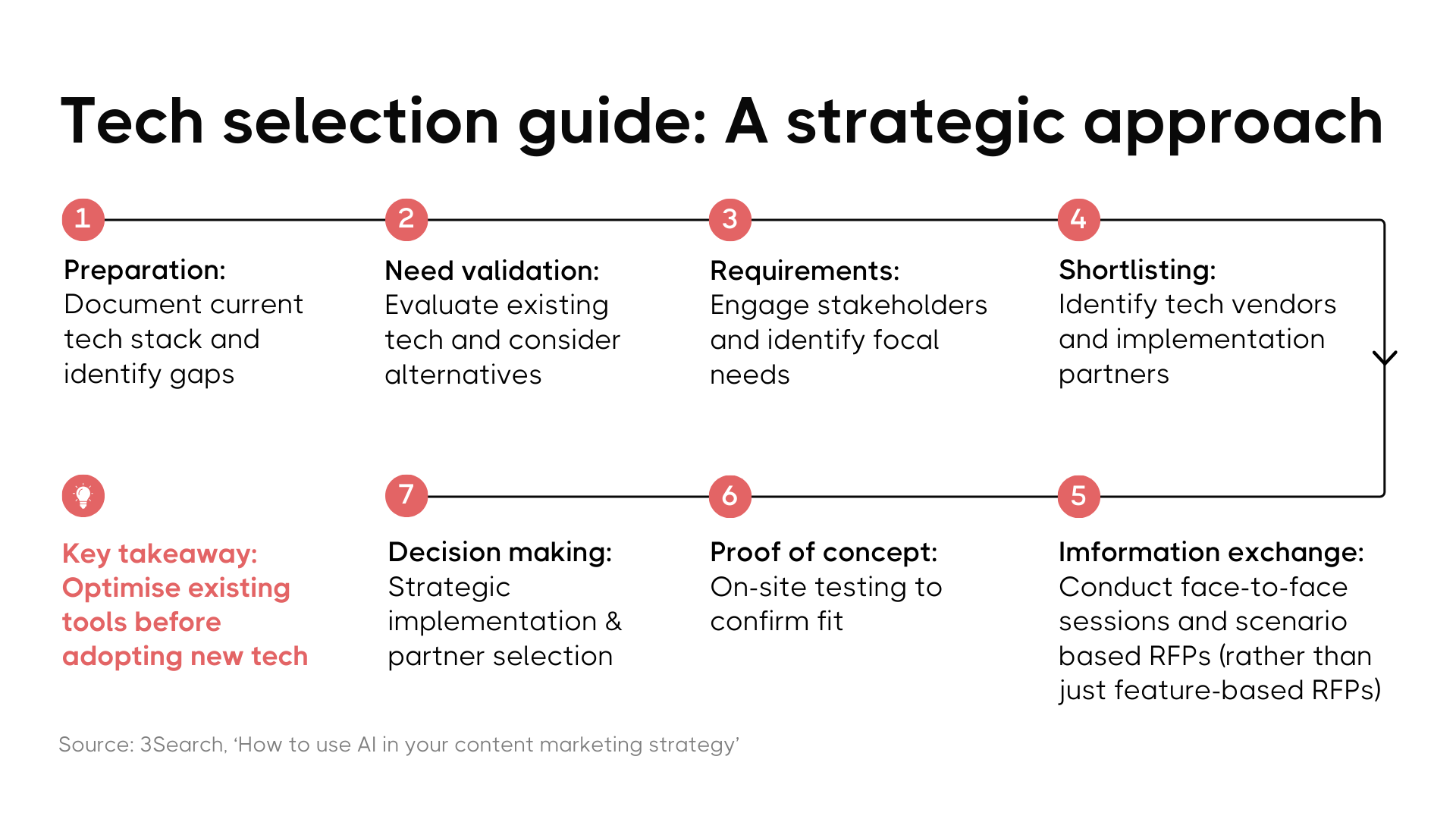
Upload Your CV
Send us your CV and a member of the team will be in touch to discuss open opportunities with you.
This blog recounts insights from our AI content workshop. Led by Scott Hamilton, we reveal t...

This blog recounts insights from our AI content workshop. Led by Scott Hamilton, we reveal the basics of how to use generative AI technology in your content marketing strategy.
By now, everyone understands the importance of investing in artificial intelligence. AI is shaping the future of content creation, so it’s crucial to explore the tools now to avoid being left behind. But one all-important question remains... “How do we effectively integrate AI into our content marketing strategies?”
To answer this question, we sat down with, Content Leader and AI Guru, Scott Hamilton. In our AI in content workshop, Scott introduced us to the basics of artificial intelligence and content marketing.
Scott Hamilton is a seasoned expert in content management and AI. His career has taken a diverse path, including journalism at Bloomberg, content marketing in financial services, and, most recently, a leadership role at an AI-powered analytics company.
Over the past 18 months, he has dedicated his career to upskilling in AI and marketing. This includes gaining practical experience with various AI tools to enhance content strategies. Scott is truly passionate about leveraging artificial intelligence to drive innovation in the content creation process.
The first step to introducing artificial intelligence into your content strategy is to understand it’s development. At the rapid pace AI is developing, the capabilities might surprise you...
AI has been quickly regarded as simply a “buzzword” by many business leaders. However, you’d be wrong to dismiss it so quickly. AI’s impact on history and society is much more profound.
Artificial intelligence is a General-Purpose Technology. A General Purpose Technology is an invention that will have a lasting impact on various areas of society, such as business, education, healthcare and more. Examples of General Purpose Technologies that have come before AI include electricity, medicine and the internet.
The internet is the most recent and similar General Purpose Technology we’ve experienced, and Scott predicted that within 10-15 years’ time AI would be just as big. So, how do you get ahead of the curve and ensure that your business is leveraging AI technology?
As with society, AI will touch every part of an organisation, from human resources to finance to marketing. Transformation is taking place across every team.
 Top tip: Scott recommends that you work in conjunction with other departments to learn from each other. Though the use cases will be different, lessons can be transferred to your content marketing strategy.
Top tip: Scott recommends that you work in conjunction with other departments to learn from each other. Though the use cases will be different, lessons can be transferred to your content marketing strategy.
Of course, our focus is on AI generated content. In the last six months, the kinds of content you can create using AI have already expanded beyond simply writing copy. Now, it’s possible to create believable images, audio and video with AI technology.
The different technologies and formats are at different stages in their development journeys. Currently, text generation is the most advanced and video is the least. However, each technology is developing at a rapid pace.
Before building your content strategy with AI in mind, it’s worth considering the following aspects:
While AI is clearly progressing rapidly, the quality of content it produces isn't always up to the standard you want unless you learn how to use the tools effectively. It's important to understand what 'good' looks like when you're using it, and how to achieve it.
Currently, the biggest challenge facing content marketers is hallucinations. This is when an AI makes things up. As a result, it’s incredibly important to review every AI generated piece of content.
With the rise in the use of AI, audiences are becoming more cautious of the content they’re consuming. Now, how a piece of content is created is just as important as its message. Knowing how your audience will feel about the use of AI-generated content can help protect your brand authenticity.
For example, when the innovative fashion and lifestyle publication, SheerLuxe, introduced an artificial intelligence employee they initially faced backlash. Readers claimed that the AI would have a negative impact on real people who were looking for work.
SheerLuxe later clarified that the “employee” was merely content. They stated, "She is an AI generated image only, and is not able to create content or articles. No jobs were compromised in any way as a result of her creation, and we would never publish any content that hasn’t had human involvement."
You should be aware of any ethical concerns that could arise from the use of AI generated content and how it impacts your brand.
As we've established, generative AI is trained on existing data and content. This means that it is not free from societal biases. You should consider potential biases when deciding to use these tools.
Many are concerned about the future of content marketing, questioning the impact AI will have on junior employees. Industry leaders must ensure that entry-level marketers are continuing to learn and upskills alongside AI.
 Top tip: Communication skills are among the most important for interacting with AI. Ensuring you understand how the tools will receive and understand the messages is the key to success.
Top tip: Communication skills are among the most important for interacting with AI. Ensuring you understand how the tools will receive and understand the messages is the key to success.
While most marketers we’ve spoken to believe that AI is a companion to the workforce, some business leaders believe the tools can replace human employees. OpenAI CEO, Sam Altman, has been quoted saying that “95% of what marketers use agencies, strategists and creative professionals for today will easily, nearly instantly and at almost no cost be handled by the AI”.
It's important to know how your business views artificial intelligence. This will allow you to help them understand how AI can really influence your marketing campaigns.
As we’ve clarified, artificial intelligence is moving at a rapid pace. Many tech organisations and software companies are implementing AI into their tools as we speak. It’s highly likely that your existing tech stack will soon have AI capabilities added to it without needing to invest in new tools.
Scott recommends following these steps to successfully implement AI into your content strategy.

Content Marketers look after a broad range of tasks. From creating simple social media post templates to high-level white papers, AI will impact each of these tasks to varying degrees.
It can be easy to become overwhelmed by the number of AI tools available. Not every tool will be right for your business. So, how do you decide which tools are right for your marketing team?
 Top tip: To understand what’s right for you, you need to look at your operation, strategy, objectives and commercials. This will help you understand what your requirements are. Then, you can assess the technologies available and how they can support your goals.
Top tip: To understand what’s right for you, you need to look at your operation, strategy, objectives and commercials. This will help you understand what your requirements are. Then, you can assess the technologies available and how they can support your goals.
Scott shared the following process to influence your decision-making.

These are just some of the tools that Scott recommends content teams could explore:
There are free versions available for each of these tools. However, the paid versions usually have more benefits that are worth exploring for your business objectives.
Now you’ve selected the tools to use in your content strategy, how do you use them? Here's a quick overview to get you started on your journey to create engaging content with AI.
Before getting stuck into the tools, you need to ensure you, and your AI tools, are prepared. Training AI to your specific needs is vital to see value from the tools. Without doing so, you will receive generic outputs from the information it has already learned.
“AI can re-package and re-purpose but cannot create original value.”
To add nuance, you must feed the technology data and context. This might include:
Scott revealed that each AI prompt is made up of a combination of these six points:
You can use these in any combination you wish.
The final step in implementing AI in your content strategy is to recognise that it's an ongoing process of innovation, experimentation, and adaptation. Your use of artificial intelligence should evolve alongside your content strategy. You will always be innovating – trialling new tools, techniques and prompts.
We want to extend a huge thank you to Scott for sharing his time and knowledge with our content workshop attendees. If you missed out on this event, but would like to attend our next one, please register your interest below.
For more information on the evolution of AI marketing, take a look at the following resources:
To ensure your content team is ready to handle AI advancements, you need to have the right employees in place. Get in touch with 3Search to find out how we can support your content recruitment needs.